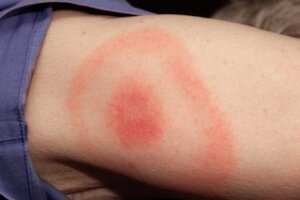Lyme disease is transmitted through the bite of an infected tick. Because ticks tend to live in forests, wooded areas and tall grasses, it is more common to contract Lyme disease if you spend time in these kinds of natural environments. It’s crucial to recognise the symptoms of Lyme disease.
What are the symptoms?
The symptoms of Lyme disease can vary, and although they tend to appear in progressive stages, those stages can overlap, which can cause confusion and delay seeking medical advice. In addition, some symptoms can occur some time (within a month) after the original bite, which itself can just look and feel similar to a mosquito bite. Because the bite itself doesn’t indicate Lyme disease, you need to keep an eye out for symptoms that develop 3 – 30 days later:
- You might notice a rash that spreads slowly across your skin. It doesn’t usually itch or hurt, but the skin can feel warm to the touch. This rash, known as erythema migrans, is the most typical sign of Lyme disease, but not everyone shows this symptom.
- You may develop symptoms such as chills, aches and pains, headaches, swollen lymph nodes, fever, and fatigue, along with the rash.
What happens if Lyme disease is untreated?

- Further rashes as described above
- Severe joint pain, especially of the knees, but this can move from one joint to another
- Neurological issues, which can develop years after the original infection, include meningitis, Bell’s palsy, and limb weakness.
What to do if you’ve been bitten?
Not all tick bites cause Lyme disease. The longer a tick remains on your skin, the higher the risk of Lyme disease. Contact your doctor right away if you think you have Lyme disease, as early intervention is always more effective. You should still contact a doctor even if your symptoms resolve – this doesn’t mean the disease itself has gone away.
















